Fleurs du Mal Magazine


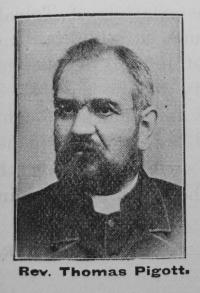
The Lion
(Being an essay written by a pupil
in Dame Europa’s School)
The Lion is a kind of Ass,
His silliness is simply crass ;
He’s such a tame, long-suffering beast
You cannot rile him in the least,
For, though he’s very, very strong,
He never will resent a wrong ;
So, though he’s very, very big.
The other beasts don’t care a fig,
But pinch his tail and tweak his ear.
For he won’t mind — He’s such a dear !
They give him most tremendous snubs.
And kill whole litters of his cubs ;
He’ll sometimes give one little roar,
Montague Horatio Mostyn Turtle Pigott
(1865–1927)
The Lion (Poem)
• fleursdumal.nl magazine
More in: Archive O-P, Mostyn Turtle Pigott, Natural history
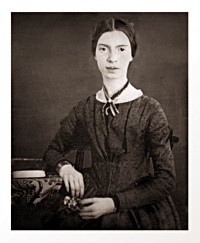
I measure every Grief I meet
I measure every Grief I meet
With narrow, probing, eyes –
I wonder if It weighs like Mine –
Or has an Easier size.
I wonder if They bore it long –
Or did it just begin –
I could not tell the Date of Mine –
It feels so old a pain –
I wonder if it hurts to live –
And if They have to try –
And whether – could They choose between –
It would not be – to die –
I note that Some – gone patient long –
At length, renew their smile –
An imitation of a Light
That has so little Oil –
I wonder if when Years have piled –
Some Thousands – on the Harm –
That hurt them early – such a lapse
Could give them any Balm –
Or would they go on aching still
Through Centuries of Nerve –
Enlightened to a larger Pain –
In Contrast with the Love –
The Grieved – are many – I am told –
There is the various Cause –
Death – is but one – and comes but once –
And only nails the eyes –
There’s Grief of Want – and grief of Cold –
A sort they call “Despair” –
There’s Banishment from native Eyes –
In sight of Native Air –
And though I may not guess the kind –
Correctly – yet to me
A piercing Comfort it affords
In passing Calvary –
To note the fashions – of the Cross –
And how they’re mostly worn –
Still fascinated to presume
That Some – are like my own –
Emily Dickinson
(1830-1886)
I measure every Grief I meet
• fleursdumal.nl magazine
More in: Archive C-D, Dickinson, Emily
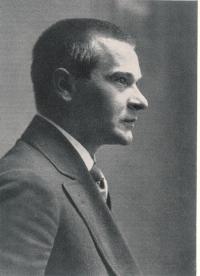
Die junge Magd
1
Oft am Brunnen, wenn es dämmert,
Sieht man sie verzaubert stehen
Wasser schöpfen, wenn es dämmert.
Eimer auf und niedergehen.
In den Buchen Dohlen flattern
Und sie gleichet einem Schatten.
Ihre gelben Haare flattern
Und im Hofe schrein die Ratten.
Und umschmeichelt von Verfalle
Senkt sie die entzundenen Lider.
Dürres Gras neigt im Verfalle
Sich zu ihren Füßen nieder.
2
Stille schafft sie in der Kammer
Und der Hof liegt längst verödet.
Im Hollunder vor der Kammer
Kläglich eine Amsel flötet.
Silbern schaut ihr Bild im Spiegel
Fremd sie an im Zwielichtscheine
Und verdämmert fahl im Spiegel
Und ihr graut vor seiner Reine.
Traumhaft singt ein Knecht im Dunkel
Und sie starrt von Schmerz geschüttelt.
Röte träufelt durch das Dunkel.
Jäh am Tor der Südwind rüttelt.
3
Nächtens übern kahlen Anger
Gaukelt sie in Fieberträumen.
Mürrisch greint der Wind im Anger
Und der Mond lauscht aus den Bäumen.
Balde rings die Sterne bleichen
Und ermattet von Beschwerde
Wächsern ihre Wangen bleichen.
Fäulnis wittert aus der Erde.
Traurig rauscht das Rohr im Tümpel
Und sie friert in sich gekauert.
Fern ein Hahn kräht. Übern Tümpel
Hart und grau der Morgen schauert.
4
In der Schmiede dröhnt der Hammer
Und sie huscht am Tor vorüber.
Glührot schwingt der Knecht den Hammer
Und sie schaut wie tot hinüber.
Wie im Traum trifft sie ein Lachen;
Und sie taumelt in die Schmiede,
Scheu geduckt vor seinem Lachen,
Wie der Hammer hart und rüde.
Hell versprühn im Raum die Funken
Und mit hilfloser Geberde
Hascht sie nach den wilden Funken
Und sie stürzt betäubt zur Erde.
5
Schmächtig hingestreckt im Bette
Wacht sie auf voll süßem Bangen
Und sie sieht ihr schmutzig Bette
Ganz von goldnem Licht verhangen.
Die Reseden dort am Fenster
Und den bläulich hellen Himmel.
Manchmal trägt der Wind ans Fenster
Einer Glocke zag Gebimmel.
Schatten gleiten übers Kissen,
Langsam schlägt die Mittagsstunde
Und sie atmet schwer im Kissen
Und ihr Mund gleicht einer Wunde.
6
Abends schweben blutige Linnen,
Wolken über stummen Wäldern,
Die gehüllt in schwarze Linnen,
Spatzen lärmen auf den Feldern.
Und sie liegt ganz weiß im Dunkel.
Unterm Dach verhaucht ein Girren.
Wie ein Aas in Busch und Dunkel
Fliegen ihren Mund umschwirren.
Traumhaft klingt im braunen Weiler
Nach ein Klang von Tanz und Geigen,
Schwebt ihr Antlitz durch den Weiler,
Weht ihr Haar in kahlen Zweigen.
Georg Trakl
(1887 – 1914)
Die junge Magd, 1913
•fleursdumal.nl magazine
More in: Archive S-T, Trakl, Georg, Trakl, Georg
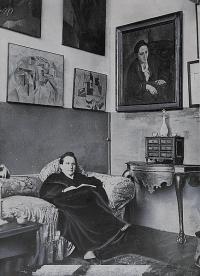 Johnny Grey
Johnny Grey
What did he say. I was disagreeing with him. He said he didn’t have it by his side. He said. Hurry.
Eat it.
I am not going to talk about it. I am not going to talk about it.
Another thing.
This is mentioned. He was silly. He said there would have been many more elevators if it hadn’t been for this war.
He was so thirsty.
They asked him.
Please.
If it weren’t for them there would be wind.
I said there wasn’t.
I said it was balmy.
I said that when I was little I asked for a closet.
This was the way it was written.
I was awed.
It is so injudicious to make plans.
We will not decide about three.
Three is the best way to add.
The bank opens tomorrow.
I was mistaken.
I hope I can continue.
To be a tailor.
The other said nothing.
The other one said he was hindering him and he made that mistake and he would not prepare further.
It is not deceiving.
I can say so gladly.
It’s always better.
It’s wonderful how it always comes out.
Conversational.
Plants were said to bring lining together. This is not deceived. This is not deceived. Plants.
Plants were said to bring meadows springing. Shattering stubbornly in their teeth.
Plants aid sad and not furniture.
This is it.
Plants are riotous.
Not even.
If you give money.
Plants are said to be left out if you give money.
Join or gray.
Points are spoken. This in one. Picturesque. It is just the same.
I cannot freeze.
I understand a picture. It is to have stop it who does. It is to have asked about it the sneezing bell. Bell or better.
A simple extenuation.
I mean to be fine with it.
A picture with all of it bitten by that supper. Call it. I shall please. Nowadays.
I find this a very pleasant pencil. Do I. I find this a very pleasant pencil. Do I find this a pleasant pencil.
How to give soldiers fresh water.
How do you.
You use the echoes.
Dear Jenny.
I am your brother. Nestling.
Nestling noses.
My gay.
Baby.
Little.
Lobster.
Chatter.
Sweet.
Joy.
My.
Baby.
Example.
Be good.
Always.
Six.
Seven.
Eight.
Nine.
All.
The.
Time.
Me.
Extra.
My.
Baby.
Scenes where there is no piece of a let it go.
No I am not pleased with their descriptions.
This is not their year.
Two of them.
Johnny Grey and Eddy.
Why not however.
It was not polite.
A long way.
I understand and I say, I understand him to say that, I see him I say I see him or I say, I say that I understand. What is it. He doesn’t realise. I don’t say that he isn’t there I don’t solidly favor him. I said I was prepared. I was prepared to relieve him. I was prepared to relieve him then or then and I was holding, I was holding anything. I am often for them. They gave it. They were pleased. So pleased and side with it. So pleased and have it. So have it and say it. Say it then. If he was promised, it, he had been left by the belief. He had the action. All old. In it. He was wretched. I do not believe or for it. I do not arouse rubbers. When we went away were we then told to be left with them. Do they or do they do it. Do they believe the truth.
I am beginning. Go on Saturday. I believe for Sunday. We deceived everbody.
I forgot to drink water.
No I haven’t seen it.
He said it.
It’s wonderful.
Target.
They don’t believe it either.
Call it.
That.
Fat.
Cheeks.
By.
That.
Time.
Drenced.
By.
That.
Time.
Obligation.
To sign.
That
Today
When
By
That
Field.
He said he was a Spanish family.
It will make.
A
Terrible
Not terrible.
It will not make that one believe me it is not for my pleasure that I promise it.
No
Neither.
That
Or
Another
Neither
One
Lightly
Widened.
Widened by what.
Not this.
Not left.
Buy
Their
It’s not a country.
I told him so.
I wish to begin.
Lining.
Of that thing.
By that time.
It.
Or.
It.
Was.
How.
We don’t know whom to invite for lunch. You told me you’d tell me. I don’t know.
Either.
I do get wonderful action into them don’t I.
Blame.
Worthy.
Out.
Standing.
Eraser.
That was a seat.
Leave it out.
Seat.
Stretch.
Sober.
Left.
Over.
Curling.
Irresistible.
I come to it at last.
I know what I want.
Call.
Tried.
To be.
Just.
Seated.
Beside.
The.
Meaning.
Please come.
I met.
A steady house which was neither blocking nor behaving as if it would for the road.
He looks like it.
A ladder insults.
Me.
I do stem when in.
I don’t look at them any more.
Johnny Grey.
What did I say.
I said I would leave it.
He was so kind.
That was lasting.
I am so certain.
Please.
It’s remarkable that I can make good sentences.
It reminds me of a play that I remember which is better.
It is better.
Everything.
In.
I am coming.
To it.
I know it.
Please.
Pleased.
Pleased with me.
Pleased with me.
Canvas covers.
I wished to go away.
I asked for an astonishing green I asked for more Bertie.
I asked only once.
Pack it.
Package.
A little leaving.
We went to eat.
I have plenty of food.
Always.
Nearly.
Always.
Certainly.
By an example.
I was never afraid.
He doesn’t say anything.
In that way.
Not after.
He was.
Sure.
Of it.
Then.
By then.
We were.
In Munich.
And sat.
Today.
By way
Of
Staring.
And nearly all of it.
In.
That.
Shining.
Firm.
Spread.
Paul.
Slices.
If I copy nature.
If I copy nature.
If I copy nature.
If I copy nature.
For it.
Open.
Seen
Piling.
Left.
In.
Left in.
Not in.
Border
Sew.
Spaces.
I.
Mean.
To.
Laugh.
Do be.
Do be all.
Do be all out.
If you can.
Come.
To stay.
And.
After.
All.
Have.
A.
Night.
Which.
Means.
That.
There
Is.
Not
This
Essential.
By that way.
It was all out in it.
By this time.
Which was reasonable and an explanation.
We never expected he would tell a lie.
Not this.
For.
More.
To be.
Indians are disappointing.
Not to me.
I was never disappointed in an Indian.
I was never disappointed in an Indian in any way.
How old are you.
Careless.
Heavy all the time.
I know she is.
I am.
Politely.
Finished.
Gertrude Stein
(1874-1946)
Johnny Grey
• fleursdumal.nl magazine
More in: Archive S-T, Archive S-T, Gertrude Stein, Stein, Gertrude
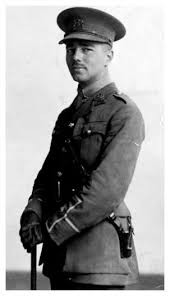
Strange Meeting
It seemed that out of battle I escaped
Down some profound dull tunnel, long since scooped
Through granites which titanic wars had groined.
Yet also there encumbered sleepers groaned,
Too fast in thought or death to be bestirred.
Then, as I probed them, one sprang up, and stared
With piteous recognition in fixed eyes,
Lifting distressful hands, as if to bless.
And by his smile, I knew that sullen hall,—
By his dead smile I knew we stood in Hell.
With a thousand fears that vision’s face was grained;
Yet no blood reached there from the upper ground,
And no guns thumped, or down the flues made moan.
“Strange friend,” I said, “here is no cause to mourn.”
“None,” said that other, “save the undone years,
The hopelessness. Whatever hope is yours,
Was my life also; I went hunting wild
After the wildest beauty in the world,
Which lies not calm in eyes, or braided hair,
But mocks the steady running of the hour,
And if it grieves, grieves richlier than here.
For by my glee might many men have laughed,
And of my weeping something had been left,
Which must die now. I mean the truth untold,
The pity of war, the pity war distilled.
Now men will go content with what we spoiled.
Or, discontent, boil bloody, and be spilled.
They will be swift with swiftness of the tigress.
None will break ranks, though nations trek from progress.
Courage was mine, and I had mystery;
Wisdom was mine, and I had mastery:
To miss the march of this retreating world
Into vain citadels that are not walled.
Then, when much blood had clogged their chariot-wheels,
I would go up and wash them from sweet wells,
Even with truths that lie too deep for taint.
I would have poured my spirit without stint
But not through wounds; not on the cess of war.
Foreheads of men have bled where no wounds were.
“I am the enemy you killed, my friend.
I knew you in this dark: for so you frowned
Yesterday through me as you jabbed and killed.
I parried; but my hands were loath and cold.
Let us sleep now. . . .”
Wilfred Owen
(1893 – 1918)
Strange Meeting (Poem)
• fleursdumal.nl magazine
More in: Archive O-P, Archive O-P, Galerie des Morts, Owen, Wilfred, WAR & PEACE
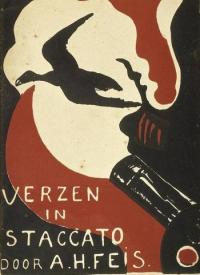
De slag.
De zon.
Een woud.
Een veld.
Een vliet:
‘t Is geel,
groen, blauw,
maar rood
is ‘t niet.
Gerij.
Gedraaf.
Geschut.
Gedreun:
Gegil!
Gekerm!
Gezucht!
Gekreun!
Geen zon.
Geen woud.
Geen mensch!
Geen hart!
‘t Is bloed!
‘t Is rood!
‘t Is grijs!
‘t Is zwart!
Agnita Feis
(1881 – 1944)
Uit: Oorlog. Verzen in Staccato (1916).
De Slag
• fleursdumal.nl magazine
More in: - Book Stories, Agnita Feis, Archive E-F, Archive E-F, De Stijl, Feis, Agnita, Theo van Doesburg
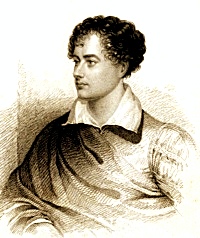
Euthanasia
When Time, or soon or late, shall bring
The dreamless sleep that lulls the dead,
Oblivion! may thy languid wing
Wave gently o’er my dying bed!
No band of friends or heirs be there,
To weep, or wish, the coming blow:
No maiden, with dishevelled hair,
To feel, or feign, decorous woe.
But silent let me sink to earth,
With no officious mourners near:
I would not mar one hour of mirth,
Nor startle friendship with a tear.
Yet Love, if Love in such an hour
Could nobly check its useless sighs,
Might then exert its latest power
In her who lives, and him who dies.
‘Twere sweet, my Psyche! to the last
Thy features still serene to see:
Forgetful of its struggles past,
E’en Pain itself should smile on thee.
But vain the wish?for Beauty still
Will shrink, as shrinks the ebbing breath;
And women’s tears, produced at will,
Deceive in life, unman in death.
Then lonely be my latest hour,
Without regret, without a groan;
For thousands Death hath ceas’d to lower,
And pain been transient or unknown.
`Ay, but to die, and go,’ alas!
Where all have gone, and all must go!
To be the nothing that I was
Ere born to life and living woe!
Count o’er the joys thine hours have seen,
Count o’er thy days from anguish free,
And know, whatever thou hast been,
‘Tis something better not to be.
George Gordon Byron
(1788 – 1824)
Euthanasia
(Poem)
• fleursdumal.nl magazine
More in: Archive A-B, Archive A-B, Byron, Lord
The Background
“That woman’s art-jargon tires me,” said Clovis to his journalist friend. “She’s so fond of talking of certain pictures as ‘growing on one,’ as though they were a sort of fungus.”
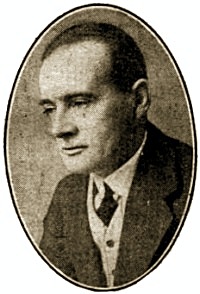 “That reminds me,” said the journalist, “of the story of Henri Deplis. Have I ever told it you?”
“That reminds me,” said the journalist, “of the story of Henri Deplis. Have I ever told it you?”
Clovis shook his head.
“Henri Deplis was by birth a native of the Grand Duchy of Luxemburg. On maturer reflection he became a commercial traveller. His business activities frequently took him beyond the limits of the Grand Duchy, and he was stopping in a small town of Northern Italy when news reached him from home that a legacy from a distant and deceased relative had fallen to his share.
“It was not a large legacy, even from the modest standpoint of Henri Deplis, but it impelled him towards some seemingly harmless extravagances. In particular it led him to patronize local art as represented by the tattoo-needles of Signor Andreas Pincini. Signor Pincini was, perhaps, the most brilliant master of tattoo craft that Italy had ever known, but his circumstances were decidedly impoverished, and for the sum of six hundred francs he gladly undertook to cover his client’s back, from the collar-bone down to the waistline, with a glowing representation of the Fall of Icarus. The design, when finally developed, was a slight disappointment to Monsieur Deplis, who had suspected Icarus of being a fortress taken by Wallenstein in the Thirty Years’ War, but he was more than satisfied with the execution of the work, which was acclaimed by all who had the privilege of seeing it as Pincini’s masterpiece.
“It was his greatest effort, and his last. Without even waiting to be paid, the illustrious craftsman departed this life, and was buried under an ornate tombstone, whose winged cherubs would have afforded singularly little scope for the exercise of his favourite art. There remained, however, the widow Pincini, to whom the six hundred francs were due. And thereupon arose the great crisis in the life of Henri Deplis, traveller of commerce. The legacy, under the stress of numerous little calls on its substance, had dwindled to very insignificant proportions, and when a pressing wine bill and sundry other current accounts had been paid, there remained little more than 430 francs to offer to the widow. The lady was properly indignant, not wholly, as she volubly explained, on account of the suggested writing-off of 170 francs, but also at the attempt to depreciate the value of her late husband’s acknowledged masterpiece. In a week’s time Deplis was obliged to reduce his offer to 405 francs, which circumstance fanned the widow’s indignation into a fury. She cancelled the sale of the work of art, and a few days later Deplis learned with a sense of consternation that she had presented it to the municipality of Bergamo, which had gratefully accepted it. He left the neighbourhood as unobtrusively as possible, and was genuinely relieved when his business commands took him to Rome, where he hoped his identity and that of the famous picture might be lost sight of.
“But he bore on his back the burden of the dead man’s genius. On presenting himself one day in the steaming corridor of a vapour bath, he was at once hustled back into his clothes by the proprietor, who was a North Italian, and who emphatically refused to allow the celebrated Fall of Icarus to be publicly on view without the permission of the municipality of Bergamo. Public interest and official vigilance increased as the matter became more widely known, and Deplis was unable to take a simple dip in the sea or river on the hottest afternoon unless clothed up to the collarbone in a substantial bathing garment. Later on the authorities of Bergamo, conceived the idea that salt water might be injurious to the masterpiece, and a perpetual injunction was obtained which debarred the muchly harassed commercial traveller from sea bathing under any circumstances. Altogether, he was fervently thankful when his firm of employers found him a new range of activities in the neighbourhood of Bordeaux. His thankfulness, however, ceased abruptly at the Franco–Italian frontier. An imposing array of official force barred his departure, and he was sternly reminded of the stringent law which forbids the exportation of Italian works of art.
“A diplomatic parley ensued between the Luxemburgian and Italian Governments, and at one time the European situation became overcast with the possibilities of trouble. But the Italian Government stood firm; it declined to concern itself in the least with the fortunes or even the existence of Henri Deplis, commercial traveller, but was immovable in its decision that the Fall of Icarus (by the late Pincini, Andreas) at present the property of the municipality of Bergamo, should not leave the country.
“The excitement died down in time, but the unfortunate Deplis, who was of a constitutionally retiring disposition, found himself a few months later, once more the storm-centre of a furious controversy. A certain German art expert, who had obtained from the municipality of Bergamo permission to inspect the famous masterpiece, declared it to be a spurious Pincini, probably the work of some pupil whom he had employed in his declining years. The evidence of Deplis on the subject was obviously worthless, as he had been under the influence of the customary narcotics during the long process of pricking in the design. The editor of an Italian art journal refuted the contentions of the German expert and undertook to prove that his private life did not conform to any modern standard of decency. The whole of Italy and Germany were drawn into the dispute, and the rest of Europe was soon involved in the quarrel. There were stormy scenes in the Spanish Parliament, and the University of Copenhagen bestowed a gold medal on the German expert (afterwards sending a commission to examine his proofs on the spot), while two Polish schoolboys in Paris committed suicide to show what THEY thought of the matter.
“Meanwhile, the unhappy human background fared no better than before, and it was not surprising that he drifted into the ranks of Italian anarchists. Four times at least he was escorted to the frontier as a dangerous and undesirable foreigner, but he was always brought back as the Fall of Icarus (attributed to Pincini, Andreas, early Twentieth Century). And then one day, at an anarchist congress at Genoa, a fellow-worker, in the heat of debate, broke a phial full of corrosive liquid over his back. The red shirt that he was wearing mitigated the effects, but the Icarus was ruined beyond recognition. His assailant was severely reprimanded for assaulting a fellow-anarchist and received seven years’ imprisonment for defacing a national art treasure. As soon as he was able to leave the hospital Henri Deplis was put across the frontier as an undesirable alien.
“In the quieter streets of Paris, especially in the neighbourhood of the Ministry of Fine Arts, you may sometimes meet a depressed, anxious-looking man, who, if you pass him the time of day, will answer you with a slight Luxemburgian accent. He nurses the illusion that he is one of the lost arms of the Venus de Milo, and hopes that the French Government may be persuaded to buy him. On all other subjects I believe he is tolerably sane.”
The Background
From ‘The Chronicles of Clovis’
by Saki (H. H. Munro)
(1870 – 1916)
• fleursdumal.nl magazine
More in: Archive S-T, Saki, Saki, The Art of Reading
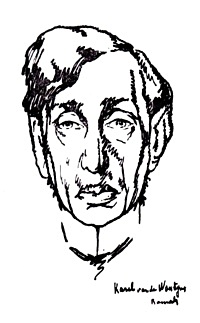
Kind met het bleek gelaat
Kind met het bleek gelaat, dat van uw wijde blikken
geen liefde in mat gebaar noch in lede ogen ziet,
maar in uw zedig kleed uw knieën weet te schikken
zó, dat me te elken male een laaie drift doorschiet:
gij zult het nimmer aan mijn vrome woorden weten
hoe mijn begeren om uw kleren dolen dorst;
maar ìk draag in me-zelf de wonde, zelf gereten,
waarvan de koortse rilt en davert door mijn borst.
Want ‘k heb de straffe zélf in ‘t lillend vlees geslagen;
ik heb een spijt’ge spot gehamerd in mijn brein…
– Gij echter, ga voorbij, arm kind, en zónder vragen:
ik haat u om dees geert’, die ‘k minne om deze pijn…
Karel van de Woestijne
(1878 – 1929)
Kind met het bleek gelaat
Portret: Karel van de Woestijne, Ramah – Journal Het Roode Zeil, 15 April 1920
• fleursdumal.nl magazine
More in: Archive W-X, Archive W-X, Woestijne, Karel van de
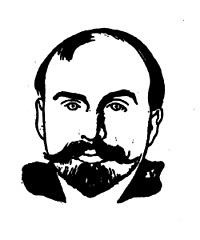
Triolet En Scie Majeure
Ce jeune lapin gras et digne
A pour petit nom Daniel.
Il est rouge comme une guigne,
Ce jeune lapin gras et digne.
Vous n’avez qu’à lui faire signe:
Il file doux comme du miel.
Ce jeune lapin gras et digne
A pour petit nom Daniel.
Ce jeune lapin gras et digne
A pour petit nom Daniel.
Si vous avez une consigne,
Ce jeune lapin gras et digne
De sa main blanche comme un cygne
Vous fera monter jusqu’au ciel.
Ce jeune lapin gras et digne
A pour petit nom Daniel.
Ce jeune lapin gras et digne
A pour petit nom Daniel.
Le teint fleuri comme la vigne,
Ce jeune lapin gras et digne,
Avec une oeillade maligne,
Flûte en parlant, comme Ariel.
Ce jeune lapin gras et digne
A pour petit nom Daniel.
Ce jeune lapin gras et digne
A pour petit nom Daniel.
Depuis huit jours il a la guigne,
Ce jeune lapin gras et digne:
Je ne puis écrire une ligne
Sans qu’il y soit trempé de fiel.
Ce jeune lapin gras et digne
A pour petit nom Daniel.
Marcel Schwob
(1867-1905)
Triolet En Scie Majeure
Juin 1888
Portrait: Félix Vallotton
• fleursdumal.nl magazine
More in: Archive S-T, Archive S-T, Félix Vallotton, Marcel Schwob
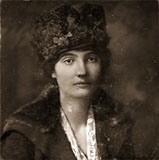
The Breath
A trembling crest
Of smoke, the winter sky
Congeals to bloom,
To please a poet’s eye:
A slender reed
Arisen from some gold
Recess or womb
Of flame to spaces cold.
Between the twigs,
That for a nest are spun
On flight’s grey loom,
A sapphire thread may run
And so between the grey,
The woven boughs of trees,
A little plume
Of mist the poet sees :
It will suffice —
Too scant a breath to name
For him to whom
It signifies a flame.
Gladys Cromwell
(1885-1919)
The Breath
From: Poems 1919
• fleursdumal.nl magazine
More in: Archive C-D, Cromwell, Gladys, Gladys Cromwell
Het Portugese woord pessoa komt van het Latijnse persona, dat zowel ‘mens’ als ‘masker’ betekent.
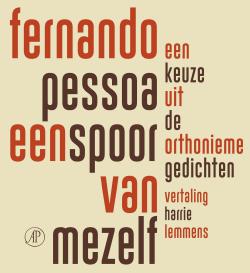 Precies daar moeten we Fernando Pessoa plaatsen, in de wereld van schijn, vermomming, spel, fictie. Hij vergelijkt zichzelf met een podium waarop allerlei acteurs rondlopen.
Precies daar moeten we Fernando Pessoa plaatsen, in de wereld van schijn, vermomming, spel, fictie. Hij vergelijkt zichzelf met een podium waarop allerlei acteurs rondlopen.
Zijn bekendste heteroniemen zijn Bernardo Soares (schrijver van het Boek der rusteloosheid) en de dichters Alberto Caeiro, Ricardo Reis en Álvaro de Campos. Pessoa heeft echter ook onder zijn eigen naam gedichten geschreven. Van dat orthonieme werk zag maar weinig het licht tijdens zijn leven.
Pas lang na zijn dood werden alle losse orthonieme gedichten bijeengebracht in drie delen van elk ruim vijfhonderd bladzijden.
Fernando Pessoa (1888-1935) was een groot Portugees dichter. Bij leven publiceerde deze kantoorklerk uit Lissabon slechts enkele werken. Na zijn dood werd op zijn huurkamer een kist aangetroffen met 27 duizend vol gekrabbelde velletjes. Uit die chaos kon een kolossaal oeuvre worden samengesteld. Niet dat van één dichter, maar van zo’n 25 ‘heteroniemen’ – afzonderlijke ‘schrijverspersoonlijkheden’ met elk een eigen stijl en woordkeus. Pessoa stierf op 47-jarige leeftijd, hij dronk zich dood.
De Arbeiderspers heeft de exclusieve vertaalrechten op zijn oeuvre. August Willemsen (1936-2007) vertaalde het leeuwendeel daarvan en schreef als introductie op de Pessoa-bibliotheek: Het ik als vreemde.
Auteur: Fernando Pessoa
Een spoor van mezelf.
Een keuze uit de orthonieme gedichten
Vertaler: Harrie Lemmens
Nederlands
Uitgeverij: De Arbeiderspers
NUR: 306
Poëzie
Paperback
296 pagina’s
ISBN: 9789029526456
Prijs: € 24,99
Publicatiedatum: 04-06-2019
• fleursdumal.nl magazine
More in: - Book News, Archive O-P, Archive O-P, Pessoa, Fernando, TRANSLATION ARCHIVE
Thank you for reading Fleurs du Mal - magazine for art & literature